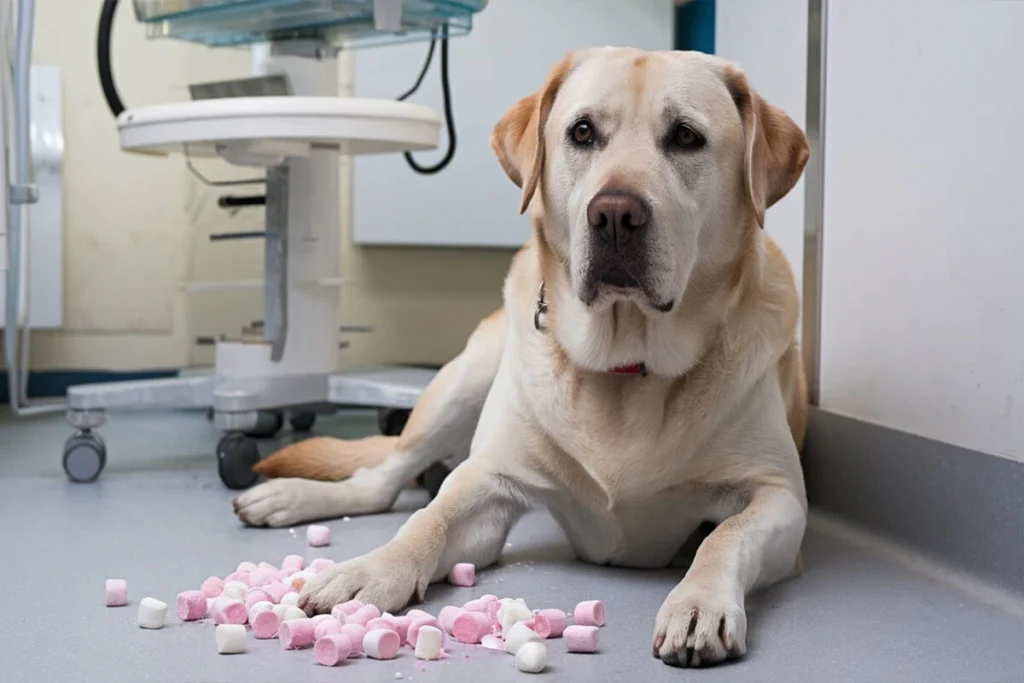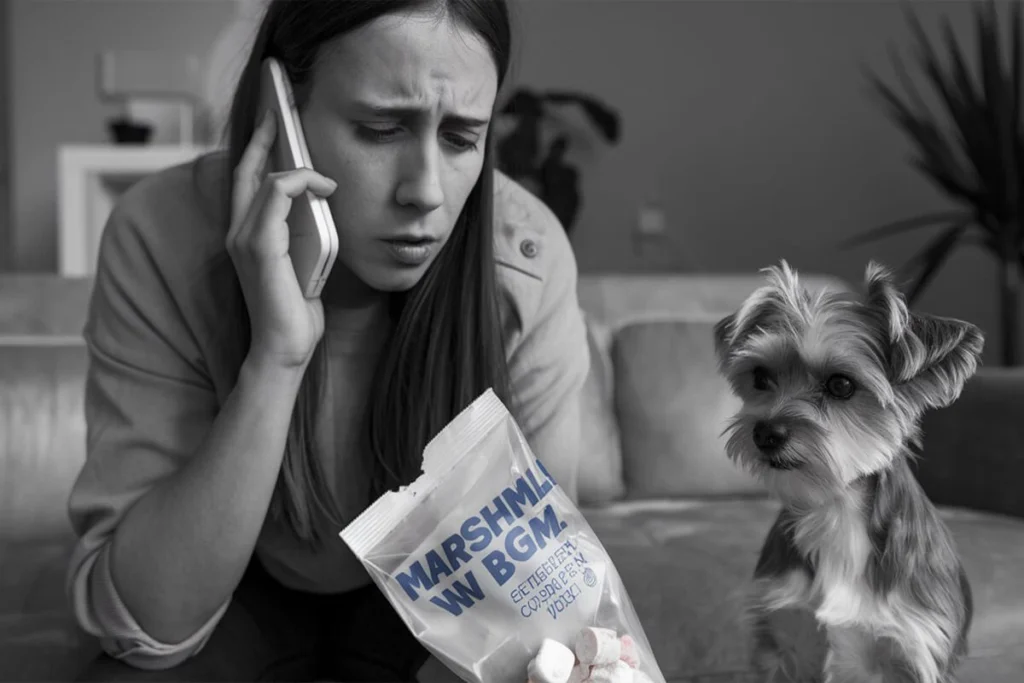Many dog owners often wonder, “Can dogs have marshmallows?” Whether you’re enjoying a cozy night by the campfire or indulging in a sweet treat at home, it’s tempting to share with your furry friend. However, before tossing a marshmallow to your pup, it’s important to understand the potential risks and effects these sugary treats can have on their health.
Marshmallows may seem harmless, but they contain high amounts of sugar and, in some cases, dangerous artificial sweeteners like xylitol, which is toxic to dogs. Even if the marshmallow doesn’t contain xylitol, the sugar content alone can lead to canine obesity, digestive issues, and long-term health concerns. As a responsible pet owner, you need to know whether these fluffy treats are safe, what ingredients to avoid, and what healthier alternatives exist.
In this post, we’ll break down everything you need to know about dogs and marshmallows. We’ll explore the potential dangers, discuss dog-safe snacks, and provide expert veterinary advice on what to do if your dog eats marshmallows. Let’s dive into the top 10 facts that every pet owner should know!
Are Marshmallows Safe for Dogs?
Explaining the Basic Ingredients of Marshmallows
Marshmallows might seem like a simple, fluffy treat, but they contain a mix of ingredients that aren’t ideal for dogs. The primary components of marshmallows include sugar, corn syrup, gelatin, and sometimes artificial flavors or colors. These ingredients give marshmallows their soft, chewy texture and sweet taste.
While sugar and corn syrup provide the sweetness, gelatin is the key ingredient that gives marshmallows their structure. Gelatin itself isn’t harmful to dogs and is even found in some dog treats. However, the high sugar content and artificial additives make marshmallows an unhealthy choice for your furry friend. Some store-bought marshmallows also contain preservatives and artificial colors, which can cause digestive discomfort or allergic reactions in sensitive dogs.
Are Plain Marshmallows Harmful or Safe for Dogs in Small Amounts?
If you’re wondering, “Can dogs have marshmallows in small amounts?”, the answer depends on the ingredients. Plain marshmallows without xylitol aren’t toxic to dogs, but they still aren’t a healthy treat. A small marshmallow might not immediately harm your dog, but regularly feeding them sugary treats can lead to weight gain, diabetes, and other health issues.
Some dog owners assume that since marshmallows don’t contain chocolate or other well-known toxic foods, they must be safe. However, even if they lack dangerous ingredients, the high sugar content can still cause problems. Dogs don’t need added sugar in their diets, and consuming too much can lead to energy spikes, followed by crashes, digestive upset, and long-term health concerns like obesity and diabetes.
If your dog accidentally eats one or two plain marshmallows, you probably don’t need to panic. However, it’s best to avoid giving them this sugary snack regularly. Instead, opt for dog-safe snacks like apple slices, carrots, or specially formulated dog treats that provide nutrients without the unnecessary sugar.
The Dangers of Artificial Sweeteners: Xylitol Toxicity
Not all marshmallows contain xylitol, but some sugar-free varieties do—and that’s where the real danger lies. Xylitol is highly toxic to dogs and can cause severe, life-threatening reactions even in small amounts. If a dog consumes a marshmallow sweetened with xylitol, their blood sugar levels can drop dangerously fast, leading to hypoglycemia (low blood sugar), seizures, liver failure, and even death.
Symptoms of xylitol poisoning can appear within 10–60 minutes after ingestion. These include:
- Weakness or lethargy
- Vomiting
- Loss of coordination
- Tremors or seizures
- Collapse
If you suspect your dog has eaten a xylitol-sweetened marshmallow, you must seek veterinary help immediately. Even if your dog seems fine at first, xylitol can cause delayed liver damage, making quick action essential.
To keep your dog safe, always check ingredient labels before giving them any human food. If a product says “sugar-free” or contains artificial sweeteners, assume it could be dangerous. When in doubt, stick to treats specifically made for dogs to ensure their health and well-being.
Potential Health Risks of Marshmallows for Dogs
Sugar and Dogs’ Diet
Many dog owners wonder, “Can dogs have marshmallows?”, but before sharing this sweet treat, it’s important to understand how sugar affects a dog’s diet. Unlike humans, dogs don’t need added sugar in their meals. Their diet should consist of high-quality proteins, healthy fats, and essential nutrients that support their overall well-being. When dogs consume too much sugar, their bodies struggle to process it properly, leading to energy spikes, crashes, and long-term health issues.

Marshmallows contain large amounts of sugar, which can contribute to inflammation, weight gain, and an increased risk of diabetes. Excess sugar can also cause dental problems, leading to plaque buildup, tooth decay, and gum disease. If your dog regularly eats sugary treats, they might experience digestive upset, changes in behavior, and a weakened immune system.
Occasionally, a small marshmallow might not seem harmful, but frequent sugar consumption can negatively impact your dog’s overall health. Instead of giving your dog sugary snacks like marshmallows, choose dog-safe treats that offer nutritional benefits, such as apple slices, carrots, or plain cooked chicken.
Canine Obesity: How Marshmallows Contribute to Weight Gain
If you’re asking, “Can dogs have marshmallows as an occasional treat?”, consider the impact on their weight. One marshmallow might not seem like much, but empty calories add up quickly, especially for smaller breeds. Dogs that regularly consume sugary treats like marshmallows are at a higher risk of canine obesity, a condition that can lead to severe health problems.
When a dog becomes overweight, they are more likely to develop:
- Joint pain and arthritis – Excess weight puts pressure on the joints, leading to pain and mobility issues.
- Heart disease – Obesity increases the risk of cardiovascular problems and high blood pressure.
- Diabetes – A high-sugar diet can cause insulin resistance, leading to diabetes in dogs.
- Reduced lifespan – Overweight dogs often live shorter, less active lives compared to healthy-weight dogs.
Marshmallows provide no nutritional value for dogs, only excess calories. If you want to reward your pup, consider healthier alternatives like low-calorie dog treats, lean meats, or crunchy vegetables. Keeping your dog’s diet balanced and nutritious will help them maintain a healthy weight and avoid obesity-related health issues.
Dog Digestion: Can Marshmallows Cause Stomach Problems?
Dogs have sensitive digestive systems, and introducing sugary, processed foods like marshmallows can cause stomach discomfort, bloating, and diarrhea. Since marshmallows contain high levels of sugar and artificial ingredients, they can be difficult for dogs to digest properly. Some dogs may experience vomiting, gas, or loose stools after eating marshmallows, especially if they have sensitive stomachs or underlying digestive issues.
Sugar can also disrupt the natural balance of gut bacteria, leading to digestive issues over time. Some marshmallows contain artificial sweeteners, preservatives, or food dyes, which can trigger allergic reactions or gastrointestinal distress.
If your dog accidentally eats a small marshmallow, they might not show immediate symptoms. However, if they consume too many, you may notice signs of an upset stomach, such as:
- Excessive drooling
- Lethargy
- Diarrhea or constipation
- Loss of appetite
If your dog experiences severe symptoms after eating marshmallows, consult your veterinarian immediately. Keeping sugary, processed foods out of reach can help prevent digestive issues and keep your dog feeling their best.
Instead of marshmallows, choose dog-friendly snacks that support digestion, such as plain pumpkin, boiled chicken, or probiotic-rich treats. By prioritizing your dog’s health and nutrition, you can help them stay active, happy, and free from digestive discomfort.
Marshmallows and Toxic Ingredients to Watch Out For
Xylitol Toxicity: Why Sugar-Free Marshmallows Are Extremely Dangerous for Dogs
Many dog owners ask, “Can dogs have marshmallows?”, but the answer becomes an absolute “no” when the marshmallows contain xylitol. This artificial sweetener, often found in sugar-free marshmallows, is highly toxic to dogs—even in tiny amounts. While xylitol is safe for human consumption, it triggers a rapid release of insulin in dogs, causing a sudden and dangerous drop in blood sugar levels. This condition, known as hypoglycemia, can occur within 10 to 60 minutes after ingestion and can be life-threatening if not treated immediately.
Signs of Xylitol Poisoning in Dogs
If a dog consumes a marshmallow (or any food) containing xylitol, they may show symptoms such as:
- Vomiting
- Weakness and lethargy
- Loss of coordination (stumbling or difficulty standing)
- Tremors or seizures
- Collapse or unconsciousness
In severe cases, xylitol poisoning can lead to liver failure and death. Unlike some toxins that cause gradual symptoms, xylitol works quickly, which is why immediate action is crucial. If you suspect your dog ate marshmallows with xylitol, contact your veterinarian or an emergency pet poison hotline immediately.
To keep your dog safe, always read ingredient labels before sharing any human food. If a product is labeled “sugar-free,” assume it may contain xylitol and never offer it to your pet. Instead, stick to dog-safe snacks designed specifically for their dietary needs.
Artificial Sweeteners: Hidden Dangers in Marshmallows and Processed Foods
Even if marshmallows don’t contain xylitol, they might still include other artificial sweeteners that aren’t safe for dogs. Some brands use sugar substitutes like sorbitol, maltitol, or aspartame, which can cause digestive issues, allergic reactions, or other health concerns in dogs.
How Artificial Sweeteners Affect Dogs
- Sorbitol & Maltitol – These sugar alcohols are common in sugar-free candies and marshmallows. While they aren’t as toxic as xylitol, they can cause severe diarrhea, bloating, and gas in dogs.
- Aspartame – While not as dangerous as xylitol, aspartame can lead to neurological symptoms in dogs if consumed in large amounts. Symptoms may include tremors, dizziness, and difficulty walking.
- Sucralose (Splenda) – Though not highly toxic, sucralose can upset your dog’s stomach, leading to diarrhea and vomiting.
Many processed foods contain these sweeteners, so checking ingredient labels is essential. If you’re unsure about a particular ingredient, avoid giving it to your dog and opt for natural, dog-safe treats instead.
Harmful Foods for Dogs: Why Marshmallows Are Just One of Many Dangerous Treats
If you’re wondering, “Can dogs have marshmallows?”, you should also be aware of other harmful foods that could pose serious health risks. While marshmallows are bad due to their high sugar content and potential xylitol toxicity, other human foods can be even more dangerous for dogs.
Common Harmful Foods That Dog Owners Should Avoid
- Chocolate – Contains theobromine, which is highly toxic to dogs and can cause seizures, heart issues, and even death.
- Grapes & Raisins – Can lead to sudden kidney failure, even in small amounts.
- Onions & Garlic – Cause damage to red blood cells, leading to anemia and severe health complications.
- Avocado – Has a substance called persin, which may make dogs feel sick and can cause them to vomit or have diarrhea.
- Macadamia Nuts – Can cause tremors, weakness, and overheating in dogs.
- Dairy Products – Many dogs are lactose intolerant, meaning milk, cheese, and ice cream can lead to digestive issues.
Marshmallows may not be as deadly as some of these foods, but they offer no nutritional value and can contribute to digestive issues, obesity, and long-term health problems.
Safer Alternatives to Marshmallows
Instead of feeding your dog sugary, processed snacks, consider healthy, natural treats such as:
- Carrot sticks – Crunchy and great for dental health.
- Apple slices (without seeds) – A naturally sweet alternative rich in vitamins.
- Pumpkin puree – Supports digestion and gut health.
- Plain, unsalted peanut butter – A high-protein treat (just ensure it’s xylitol-free).
Keeping these dog-safe snacks on hand will help you avoid feeding your pet something that could harm them. Always prioritize your dog’s health by choosing treats that support their nutrition rather than indulging them with sugary, potentially dangerous foods like marshmallows.
Safer Alternatives to Marshmallows for Dogs
Dog-Safe Snacks: Healthier Alternatives to Marshmallows
Many pet owners ask, “Can dogs have marshmallows?”, but the better question is: “What are healthier treats for dogs?” While marshmallows contain excessive sugar and no nutritional benefits, plenty of dog-safe snacks offer both taste and health benefits. Choosing the right treats helps keep your dog happy while supporting their overall well-being.

Healthy and Safe Treats for Dogs
If you’re looking for nutritious alternatives to marshmallows, consider these options:
- Carrot Sticks – Low in calories, great for dental health, and packed with vitamins.
- Apple Slices (Seedless) – Naturally sweet, rich in fiber, and beneficial for digestion.
- Blueberries – Loaded with antioxidants, vitamins, and minerals that support immune health.
- Pumpkin Puree – Excellent for digestion and a tasty low-calorie treat.
- Unsweetened Plain Yogurt – A probiotic-rich snack that helps gut health (if your dog tolerates dairy).
- Plain, Cooked Chicken – A high-protein treat that’s easy to digest and packed with nutrients.
Avoid giving dogs processed human snacks, even if they seem harmless. Sticking to natural, dog-friendly foods ensures they get the nutrients they need without the health risks associated with sugar and artificial ingredients.
Veterinary Advice: What Experts Say About Dogs and Marshmallows
Veterinarians often stress the importance of feeding dogs a balanced diet and avoiding unnecessary sugars. When asked, “Can dogs have marshmallows?”, most vets advise against it because of the high sugar content, lack of nutritional value, and potential digestive issues.
Why Vets Recommend Avoiding Marshmallows
- No Nutritional Benefit – Marshmallows provide zero essential nutrients for dogs.
- Risk of Canine Obesity – Too much sugar can contribute to weight gain and diabetes.
- Digestive Problems – Dogs who eat marshmallows may experience vomiting, diarrhea, or stomach discomfort.
- Toxic Ingredients – Some marshmallows contain xylitol, artificial flavors, or preservatives, which can be dangerous for dogs.
If you want to reward your dog with a treat, vets suggest choosing nutrient-dense options rather than empty-calorie snacks like marshmallows. Even if your dog accidentally eats a small marshmallow, monitor them closely and ensure they don’t develop signs of digestive upset. If they consume a sugar-free marshmallow that contains xylitol, seek emergency veterinary care immediately.
Homemade Treat Ideas: Delicious and Healthy DIY Dog Snacks
Instead of wondering, “Can dogs have marshmallows?”, consider making your own healthy, dog-friendly treats at home. Homemade treats allow you to control the ingredients, ensuring your dog gets a nutritious, safe, and tasty snack without the risks associated with sugar and artificial additives.
Easy and Healthy Homemade Dog Treats
- Frozen Banana Bites
- Mash a banana and mix it with a little plain yogurt.
- Put small amounts of the mixture on a baking tray and freeze them.
- Serve as a refreshing and nutritious treat.
- Peanut Butter Pumpkin Biscuits
- Mix pure pumpkin puree, natural peanut butter (xylitol-free), and oat flour.
- Roll the dough and cut into small shapes.
- Bake at 350°F (175°C) for 20–25 minutes until firm.
- Apple and Carrot Dog Chews
- Slice apples and carrots into thin strips.
- Bake at low heat (200°F/95°C) for a few hours until dehydrated.
- These chewy treats are packed with vitamins and great for dental health.
- Frozen Chicken Broth Cubes
- Pour low-sodium chicken broth into an ice cube tray and freeze.
- Serve on hot days as a tasty and hydrating snack.
Making your own dog treats ensures that your furry friend gets a wholesome snack without unhealthy ingredients. By choosing homemade alternatives instead of processed treats like marshmallows, you’ll help support your dog’s health, digestion, and energy levels while still giving them something delicious to enjoy.
What to Do If Your Dog Eats Marshmallows?
Recognizing Symptoms: How to Tell if Your Dog Had a Bad Reaction to Marshmallows
If you’re asking, “Can dogs have marshmallows?”, it’s important to also understand the potential symptoms of a bad reaction. While one or two plain marshmallows may not immediately harm a dog, consuming too many—or eating marshmallows containing xylitol—can lead to serious health issues. Recognizing symptoms early can help you take quick action and prevent further complications.
Signs That Marshmallows Are Causing a Problem
- Digestive Issues – Vomiting, diarrhea, bloating, or excessive gas.
- Lethargy or Weakness – A sudden drop in energy levels or refusal to move.
- Excessive Thirst or Urination – Sugar can disrupt a dog’s hydration levels.
- Restlessness or Hyperactivity – A sugar rush may cause unusual energy spikes, followed by crashes.
- Pawing at the Mouth or Drooling – Signs of nausea or discomfort.
If a dog eats marshmallows containing xylitol, the symptoms can be much more severe and life-threatening:
- Sudden vomiting
- Loss of coordination or stumbling
- Seizures or tremors
- Collapse or unconsciousness
Xylitol poisoning can cause a dangerous drop in blood sugar levels within minutes, so recognizing these symptoms as soon as possible is critical.
When to Contact a Vet: Knowing When It’s an Emergency
Many dog owners assume that if their pet eats something sugary, they’ll simply experience mild digestive upset. However, some cases require immediate veterinary attention. If you’re worried about whether dogs can have marshmallows, knowing when to call the vet can make all the difference in your dog’s health and safety.

Call Your Vet Immediately If:
- Your dog ate sugar-free marshmallows (risk of xylitol poisoning).
- Your dog shows severe vomiting or diarrhea that lasts more than a few hours.
- You notice weakness, tremors, or loss of coordination.
- Your dog becomes lethargic, unresponsive, or has difficulty standing.
- You suspect your dog ate a large quantity of marshmallows, leading to potential sugar overdose or digestive blockages.
For minor cases where your dog ate a small amount of plain marshmallow, monitor them closely. If they develop any digestive discomfort or unusual behavior, contacting a vet for guidance is always a good idea.
Prevention Tips: Keeping Your Dog Safe from Harmful Snacks
Instead of worrying about whether dogs can have marshmallows, the best approach is to prevent access to sugary, unhealthy, or toxic foods altogether. Training, proper storage, and healthier treat alternatives can all help protect your pet.
Ways to Prevent Your Dog from Eating Marshmallows or Other Harmful Snacks
- Store Human Treats Out of Reach
- Keep marshmallows, candies, and other sweets in closed containers or cabinets.
- Avoid leaving food on countertops where curious dogs might grab them.
- Train Your Dog with “Leave It” and “Drop It” Commands
- Teaching your dog to ignore or release food on command can prevent accidental ingestion.
- Reinforce this training with positive rewards like dog-safe treats.
- Educate Family Members and Guests
- Make sure everyone in the household knows not to share marshmallows or sugary snacks with the dog.
- If you have kids, remind them that some human foods are dangerous for pets.
- Offer Healthy Dog-Safe Alternatives
- Keep safe, natural treats on hand so your dog isn’t tempted by unhealthy options.
- Try fresh fruits, veggies, or vet-approved dog chews instead of processed snacks.
- Be Extra Cautious with Sugar-Free Products
- Always check ingredient labels before sharing any human food with your pet.
- Assume that anything labeled “sugar-free” could contain xylitol and never risk it.
By taking these simple precautions, you can ensure your dog stays healthy, happy, and safe from harmful foods. While it may be tempting to share your favorite snacks, sticking to dog-friendly treats will help your furry friend enjoy a long, active life—without the risks of sugar, artificial sweeteners, or toxic ingredients.
Conclusion
If you’re wondering, “Can dogs have marshmallows?”, the answer depends on the ingredients and the risks involved. While plain marshmallows without xylitol are not toxic in small amounts, they still pose serious health concerns due to their high sugar content, lack of nutrition, and potential digestive issues. Feeding dogs sugary treats like marshmallows can contribute to canine obesity, poor digestion, and long-term health problems. Even a single marshmallow can upset a dog’s stomach, leading to vomiting, diarrhea, or an energy crash from the sugar spike.
The biggest danger comes from sugar-free marshmallows that contain xylitol, an artificial sweetener that is highly toxic to dogs. Even a tiny amount of xylitol can cause a rapid drop in blood sugar, seizures, liver failure, or even death. If your dog accidentally eats a marshmallow with xylitol, you need to seek emergency veterinary care immediately.
Instead of taking risks with marshmallows, choose dog-safe snacks that provide real nutritional value. Fresh fruits like apples (without seeds), blueberries, and carrots make healthier alternatives. If you want to give your dog a sweet treat, consider making homemade, vet-approved snacks that support their digestion and overall well-being.
Your dog’s health depends on the choices you make. Being mindful of what they eat helps prevent unnecessary health issues and keeps them feeling their best. Next time you’re tempted to share a marshmallow, remember that a dog-safe treat is always a better choice—because your furry friend deserves the best!
Can Dogs Have Cherries? Top 8 Facts Dog Owners should know!
Discover more About Dogs And Different Breeds Here!
Find Out Why a Dog Collar is the Best Gift you can give to your Beloved Pup From Here.
Find Some Good Stuff For your Dog on PetMD Official.

1 thought on “can dogs have marshmallows? Top 10 Facts You Need to know”
Comments are closed.